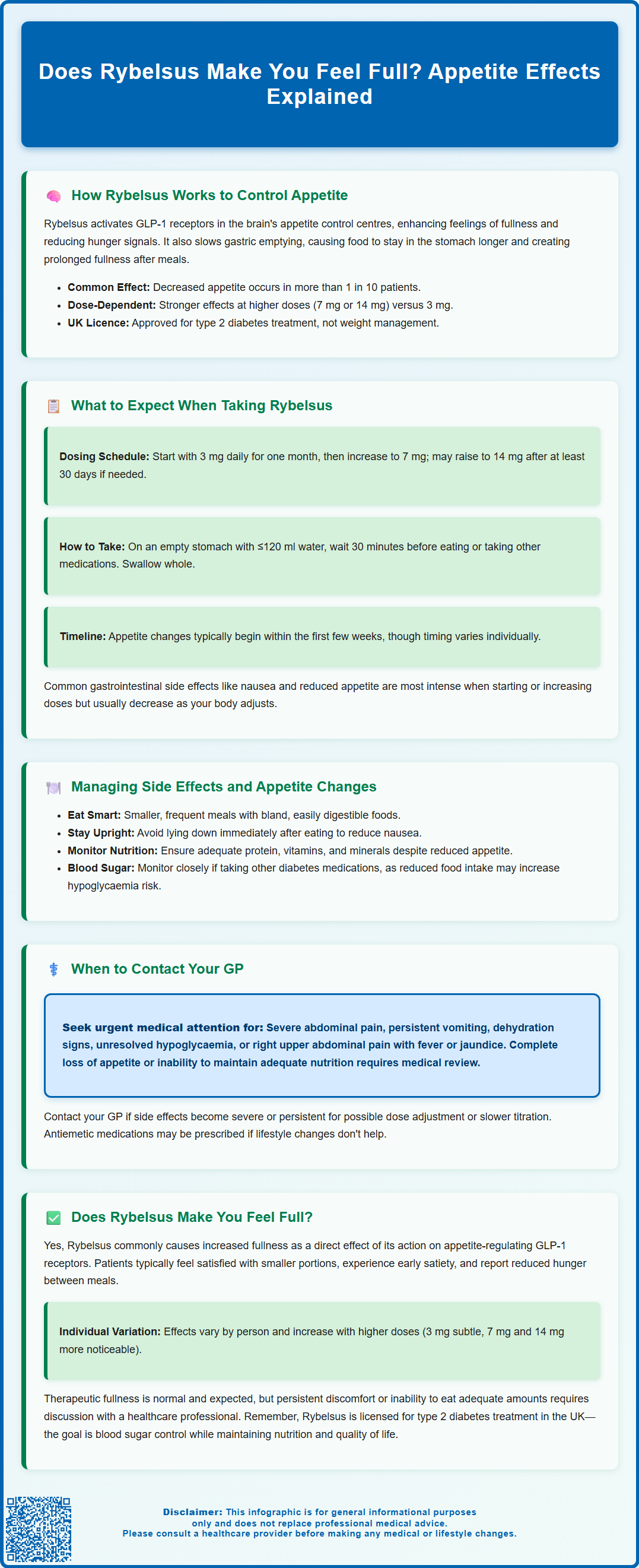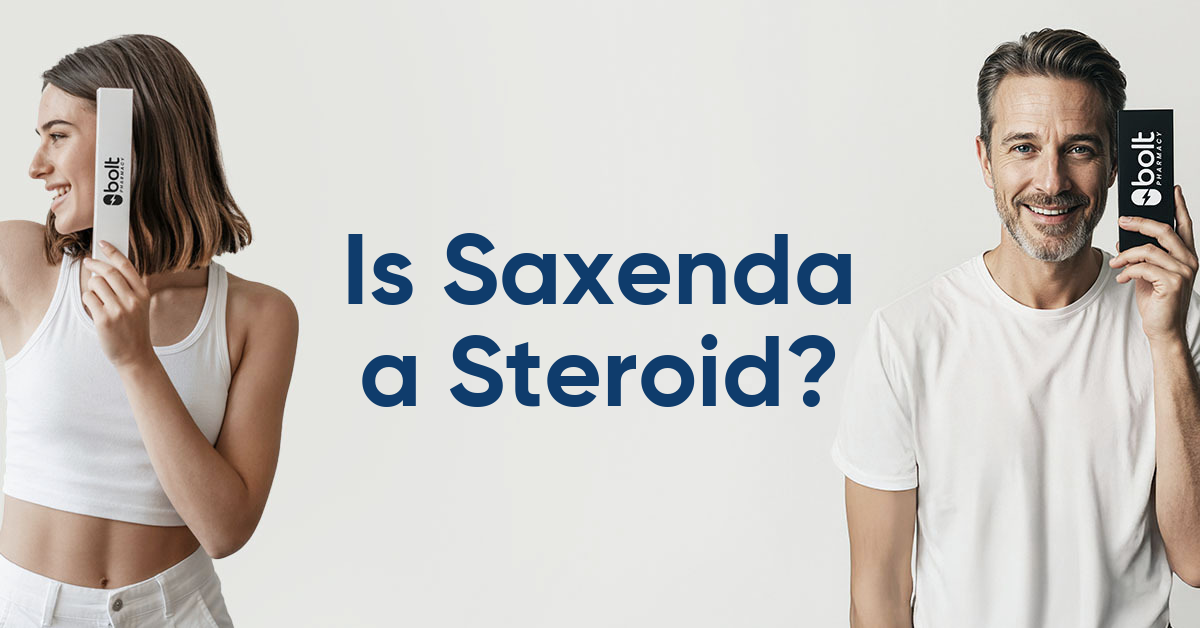Rybelsus (semaglutide) is an oral medication licensed in the UK for type 2 diabetes that commonly affects appetite and satiety. Many patients taking Rybelsus report feeling fuller during and after meals, experiencing reduced hunger between meals, and finding themselves satisfied with smaller portions. These effects result from the medication's action on GLP-1 receptors in the brain and digestive system, which regulate appetite and slow gastric emptying. Understanding how Rybelsus influences feelings of fullness can help patients manage their treatment effectively whilst maintaining adequate nutrition and glycaemic control.
Summary: Yes, Rybelsus commonly makes patients feel fuller by activating GLP-1 receptors that regulate appetite and by slowing gastric emptying.
- Rybelsus is a GLP-1 receptor agonist licensed in the UK for type 2 diabetes, not weight management
- Decreased appetite occurs in more than 1 in 10 patients and is dose-dependent
- The medication slows gastric emptying, prolonging feelings of fullness after meals
- Effects typically appear within the first few weeks and become more pronounced at therapeutic doses of 7 mg or 14 mg
- Patients should contact their GP if appetite changes prevent adequate nutrition or cause persistent discomfort
Table of Contents
How Rybelsus Works to Control Appetite
Rybelsus (semaglutide) is an oral glucagon-like peptide-1 (GLP-1) receptor agonist licensed in the UK for the treatment of type 2 diabetes mellitus. Its mechanism of action extends beyond glycaemic control to include significant effects on appetite regulation and satiety. Understanding how this medication influences feelings of fullness requires an appreciation of the physiological pathways it targets.
Semaglutide mimics the action of naturally occurring GLP-1, a hormone released by the intestines in response to food intake. GLP-1 receptors are found throughout the body, including in the pancreas, gastrointestinal tract, and crucially, in areas of the brain that regulate appetite and food intake. When Rybelsus activates these receptors in the hypothalamus and brainstem, it enhances satiety signals and reduces hunger. This central nervous system effect is one of the primary mechanisms by which the medication influences eating behaviour.
Additionally, Rybelsus slows gastric emptying, meaning food remains in the stomach for longer periods. This delayed transit contributes to prolonged feelings of fullness after meals and can reduce the desire to eat between meals. This effect is typically most pronounced early in treatment and may diminish over time as the body adapts to the medication.
The MHRA-approved Summary of Product Characteristics (SmPC) for Rybelsus acknowledges decreased appetite as a very common side effect, occurring in more than 1 in 10 patients. These appetite-suppressing effects appear to be dose-dependent, with more pronounced effects often observed at therapeutic doses of 7 mg or 14 mg daily compared to the initial 3 mg dose. It is important to note that while weight loss is commonly observed in patients taking Rybelsus, the medication is licensed specifically for type 2 diabetes management in the UK, not for weight management.

What to Expect When Taking Rybelsus
When initiating Rybelsus therapy, patients typically begin with a 3 mg dose once daily for the first month. This starting dose is not intended to provide full therapeutic effect but rather to allow the body to adjust to the medication and minimise gastrointestinal side effects. After this initial period, the dose is increased to 7 mg daily. If additional glycaemic control is required after at least 30 days on the 7 mg dose, the prescriber may consider escalating to 14 mg daily.
Many patients report noticing changes in their appetite and eating patterns within the first few weeks of treatment, though individual responses vary considerably. Some individuals experience a reduction in hunger almost immediately, whilst others may notice more gradual changes as the dose is increased. It is important to understand that Rybelsus must be taken correctly to ensure adequate absorption—specifically, on an empty stomach with no more than 120 ml of water, at least 30 minutes before any food, drink, or other oral medications. The tablet should be swallowed whole and not split, crushed or chewed. If a dose is missed, patients should skip that dose and take the next scheduled dose the following day; they should not take an extra tablet to make up for the missed dose.
During the initial weeks, patients commonly experience gastrointestinal symptoms including nausea, reduced appetite, and occasionally vomiting or diarrhoea. These effects are generally most pronounced when starting treatment or increasing the dose, and typically diminish over time as the body adapts. The sensation of fullness may be accompanied by these side effects initially, which can make it challenging to distinguish between therapeutic appetite suppression and medication-related discomfort.
Patients should maintain regular contact with their healthcare team during dose titration. Blood glucose monitoring remains important, particularly for those taking other diabetes medications, as the appetite-suppressing effects of Rybelsus may lead to reduced food intake and potential hypoglycaemia risk when combined with insulin or sulphonylureas. Dose reductions of these medications may be needed under clinical supervision. NICE guidance recommends individualised treatment approaches, with dose adjustments based on both glycaemic response and tolerability.
Patients taking levothyroxine or other medications affected by delayed gastric emptying should discuss potential monitoring needs with their healthcare provider, as absorption of these medicines may be affected.
Managing Side Effects and Appetite Changes
The appetite-suppressing effects of Rybelsus, whilst therapeutically beneficial for many patients, require thoughtful management to ensure adequate nutrition and minimise discomfort. Gastrointestinal side effects are the most commonly reported adverse reactions, affecting a substantial proportion of patients, particularly during treatment initiation and dose escalation.
Practical strategies can help patients manage these effects:
-
Eat smaller, more frequent meals rather than large portions, which may feel overwhelming when appetite is reduced
-
Choose bland, easily digestible foods during periods of nausea, avoiding high-fat or heavily spiced meals that may exacerbate symptoms
-
Stay well hydrated, taking small sips of water throughout the day, though remembering to observe the 30-minute fasting period after taking Rybelsus
-
Avoid lying down immediately after eating, as this may worsen feelings of fullness or nausea
-
Monitor nutritional intake to ensure adequate protein, vitamins, and minerals despite reduced appetite
If side effects become severe or persistent, patients should contact their GP or diabetes specialist nurse. Dose reduction may be appropriate in some cases, or the rate of titration can be slowed. Antiemetic medications are occasionally prescribed for refractory nausea, though lifestyle modifications are typically attempted first.
Patients should seek urgent medical attention if they experience:
-
Severe, persistent abdominal pain (potential pancreatitis) – stop taking Rybelsus immediately and seek urgent medical review
-
Persistent vomiting preventing adequate fluid intake
-
Signs of dehydration (dark urine, dizziness, reduced urination) which may lead to acute kidney injury
-
Symptoms of hypoglycaemia that do not resolve with usual treatment
-
Right upper abdominal pain, fever, or yellowing of the skin/eyes (potential gallbladder disease)
Patients with pre-existing diabetic retinopathy should be aware that rapid improvement in blood glucose control may temporarily worsen retinopathy. Any new visual disturbances should be promptly reported to healthcare professionals.
It is worth noting that whilst reduced appetite is common, complete loss of appetite or inability to maintain adequate nutrition is not an expected effect and warrants medical review. The goal is controlled appetite regulation that supports both glycaemic management and overall health, not nutritional compromise.
Patients are encouraged to report any suspected side effects to the MHRA Yellow Card Scheme (yellowcard.mhra.gov.uk).
Does Rybelsus Make You Feel Full?
Yes, Rybelsus commonly makes patients feel fuller, both during and after meals. This is not an incidental side effect but rather a direct consequence of the medication's mechanism of action on GLP-1 receptors involved in appetite regulation and gastric function. According to the MHRA-approved product information, decreased appetite is classified as a very common side effect, occurring in more than 1 in 10 patients taking Rybelsus.
The sensation of fullness associated with Rybelsus manifests in several ways. Patients frequently describe feeling satisfied with smaller portions of food than they previously required, experiencing a sense of fullness that arrives earlier during meals. This early satiety can be particularly pronounced, with some individuals finding they simply cannot finish meals of a size they would have comfortably consumed before starting treatment. Between meals, many patients report reduced hunger, and some describe experiencing fewer food cravings, though individual experiences vary considerably.
The intensity of these effects varies between individuals and is influenced by the dose of Rybelsus. At the starting dose of 3 mg, appetite effects may be subtle or absent in some patients, becoming more noticeable at therapeutic doses of 7 mg or 14 mg. Some patients find the sensation of fullness entirely comfortable and helpful for managing their eating habits, whilst others may initially find it disconcerting or uncomfortable, particularly if accompanied by nausea.
It is important to emphasise that feeling full is not the same as feeling unwell. Whilst therapeutic satiety is expected and generally beneficial, persistent discomfort, pain, or inability to eat adequate amounts should be discussed with a healthcare professional. Weight loss is commonly observed in clinical trials of Rybelsus, with greater reductions typically seen at higher doses. In the PIONEER clinical trial programme, weight changes varied by dose and study duration, with more substantial reductions generally observed with the 14 mg dose compared to 7 mg.
For patients concerned about these effects or those who find the sensation of fullness excessive, dose adjustment or treatment modification may be considered in consultation with their prescriber. It is important to remember that Rybelsus is licensed in the UK specifically for the treatment of type 2 diabetes, not for weight management. The goal of Rybelsus therapy is to achieve glycaemic control whilst maintaining quality of life and adequate nutrition, not to cause distressing symptoms or nutritional deficiency.
Frequently Asked Questions
How quickly does Rybelsus affect appetite?
Many patients notice changes in appetite and feelings of fullness within the first few weeks of treatment, though individual responses vary. Effects typically become more pronounced as the dose is increased from 3 mg to 7 mg or 14 mg daily.
Is feeling full on Rybelsus a side effect or intended effect?
Feeling fuller is a direct consequence of Rybelsus's mechanism of action on GLP-1 receptors that regulate appetite. Decreased appetite is classified as a very common side effect in the MHRA-approved product information, occurring in more than 1 in 10 patients.
What should I do if Rybelsus makes me feel too full to eat properly?
If feelings of fullness prevent adequate nutrition or cause persistent discomfort, contact your GP or diabetes specialist nurse. Dose adjustment, slower titration, or treatment modification may be appropriate to ensure you maintain adequate nutrition whilst achieving glycaemic control.
The health-related content published on this site is based on credible scientific sources and is periodically reviewed to ensure accuracy and relevance. Although we aim to reflect the most current medical knowledge, the material is meant for general education and awareness only.
The information on this site is not a substitute for professional medical advice. For any health concerns, please speak with a qualified medical professional. By using this information, you acknowledge responsibility for any decisions made and understand we are not liable for any consequences that may result.
Heading 1
Heading 2
Heading 3
Heading 4
Heading 5
Heading 6
Lorem ipsum dolor sit amet, consectetur adipiscing elit, sed do eiusmod tempor incididunt ut labore et dolore magna aliqua. Ut enim ad minim veniam, quis nostrud exercitation ullamco laboris nisi ut aliquip ex ea commodo consequat. Duis aute irure dolor in reprehenderit in voluptate velit esse cillum dolore eu fugiat nulla pariatur.
Block quote
Ordered list
- Item 1
- Item 2
- Item 3
Unordered list
- Item A
- Item B
- Item C
Bold text
Emphasis
Superscript
Subscript












